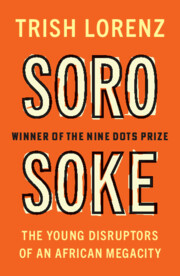‘There may be times when we are powerless to prevent injustice, but there must never be a time when we fail to protest.’
***
‘Everybody knows the kind of country we are from. We have issues with human rights, with terrorism, with school children being kidnapped. Especially for young people, every day is about survival.

Figure 32 Rinu Oduala, 23, activist and organiser of the #endSARS movement
It is the young generation that bears the brunt of police brutality. It is really a matter of survival. You can die here at any time. Young people instinctively know that if you are in the wrong place at the wrong time and with the wrong police, it becomes a matter of survival. The police are supposed to keep us safe, to look out for us, but instead they seek to extort from you, anything from US$1 to thousands of dollars. They will torture you to get the money and if you are really unlucky, you die.
The police generally are bad eggs, but SARS [the Special Anti-Robbery Squad police unit] are extra bad eggs. They have degenerated into criminals in uniform. They were formed to deal with robbery and kidnapping and now they are doing the kidnapping themselves. They are framing people on bogus charges and only if you have the money to pay them, you can go free.
On 20 June 2020, a 16-year-old girl was killed by a police officer. It was around the same time George Floyd was killed in the US. We saw the way mass protests built up around his death and the growth of Black Lives Matter. I met up with friends and started a protest and online petition. We were met with nonchalance from the police. They think nothing will change at the end of it all. Then in October another video came out. A man was arrested, the police drive off and the guy falls or is pushed from the van. This is not the first time this has happened. We face this kind of thing every day. There’s this quote: “There may be times when we are powerless to prevent injustice, but there must never be a time when we fail to protest.” So, we decided to protest again.
We decided let’s sleep out on the streets. It sounds crazy but if our homes and our cars aren’t safe – they can barge in your home anytime without a warrant, steal your valuables or stop you on the road, plant evidence and extort you before they let you go – if our roads and homes are not safe, let’s all be out on the street.
On 7 October, we protested on the streets outside police headquarters and on 8 October, outside the State Assembly. In the middle of the night, on 8 October, we were almost killed by the police. They were pointing guns at us, and they would have shot us. It’s only because we were live streaming videos that they did not.
The police action outside the State Assembly meant that the next protest really blew up across the country. We had protests in all the states. The Feminist Coalition started crowdfunding. We used all forms of technology. Twitter really amplified the protests, even Jack Dorsey, the Twitter CEO, was involved. We used Facebook, and Instagram and crowdfunding to get protestors out of prison. We used bitcoin when the Nigerian government shut down our financial accounts.
The protests grew. They got bigger and bigger. Then came 20 October.’


